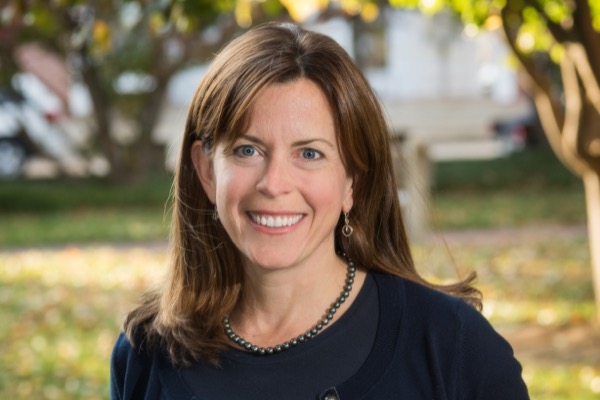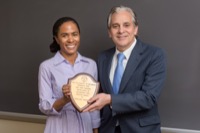
Professor of the Year
UD's Morling selected for national Carnegie Foundation award
9:57 a.m., Nov. 20, 2014--The University of Delaware’s Beth Morling, who says she “reverse-engineers” her psychology courses to help students reach specific goals as critical thinkers, has been named the 2014 Professor of the Year for the state of Delaware.
Morling, professor of psychological and brain sciences who specializes in cultural and social psychology, received the award Nov. 20 from the Council for the Advancement and Support of Education (CASE) and the Carnegie Foundation for the Advancement of Teaching. Each year, those organizations select the nation’s best undergraduate educators.
Honors Stories
National Medal of Science
Warren Award
Only a dozen Delaware professors have received the award since the U.S. Professors of the Year program began in 1981. There is not a guaranteed winner in each state every year because all candidates must meet rigorous criteria.
Morling, who joined the UD faculty in 2003, said that working at a research university gives her the opportunity to blend her loves of both research and teaching.
“My role at UD is more of a teaching professor than a research professor. I really like having the opportunity to work in both roles instead of choosing one or the other,” she said. “Being active in some research keeps you right on the cutting edge of where a professor needs to be. But in many ways, I also have the perspective of a liberal arts college, where the focus is always on teaching.”
Morling, whose research includes cross-cultural comparisons between North America and Japan, teaches undergraduate courses at UD in cultural psychology and in research methods, as well as a senior course called The Social Self. This winter, she is offering a new, one-credit class on the psychology of food. Morling also leads a graduate course in how to teach psychology to undergraduates that is required before graduate students in the department are permitted to teach their own classes.
“In those graduate courses, we study the research about teaching and learning, the best practices in teaching college courses and practical exercises like how to develop a syllabus and plan classroom activities,” she said. “I love teaching graduate students and preparing them to be teachers, but I also love my sophomore research methods classes; the students learn and grow so much in that class.”
Morling begins planning a course by figuring out what she specifically wants her students to be able to do after completing it. For example, she said, she might want them to analyze the argument made in a popular press report, or publish an intelligent, research-based comment on the Internet, or write about psychological science for a student newspaper.
“I write these final assignments and then work backwards, designing homework, team-based activities, reading or writing that help me coach students to reach these goals,” she wrote in a statement explaining her teaching methods. “My typical learning goals involve critical thinking — systematic, scientific reasoning that requires lots of practice and coaching.”
Students clearly respond to her classroom style, frequently nominating her for the University’s teaching and advising awards. Students also wrote to CASE in support of her Professor of the Year nomination.
Kristen E. Riley, who graduated from UD in 2010 and is now a doctoral candidate in clinical psychology at the University of Connecticut, praised Morling’s “superior teaching skills” and “deep devotion to teaching.”
“During my freshman year, I stepped into Dr. Morling’s Honors Introduction to Research Methods course, immediately recognizing that there was something categorically different about her teaching style than any other,” Riley wrote to CASE, adding that the professor “made herself very available to the students, patiently answering questions and consistently staying after class to provide extra support.”
Later, Riley said, Morling encouraged her to apply to doctoral programs and helped her connect with a research mentor who has shaped her career.
Another former student, Nick Gottuk, who graduated in May, also wrote on behalf of Morling’s nomination for the award.
“Professor Morling’s enthusiastic personality and passion for learning is contagious to all around her,” Gottuk said. “What I enjoyed most about her assignments was the real life application. I learned how to analyze and interpret data, how to write to a variety of audiences, and how to form and support my own opinions based on the most current research, but most importantly I learned to have a broader world view and acknowledge the cultural lens through which I view every aspect of my environment.”
In addition to her own teaching and preparing graduate students to teach, Morling is active in numerous other efforts to improve instruction. She serves on the board and program committee of the National Institute for the Teaching of Psychology, is on the editorial board of the journal Teaching of Psychology, co-edits a Society for the Teaching of Psychology blog, has helped lead workshops at UD’s Institute for Transforming Undergraduate Education and has published a textbook, Research Methods in Psychology: Evaluating a World of Information.
“Perhaps one of her biggest and strongest contributions to the teaching of psychology is her research methods textbook,” said Regan A.R. Gurung, a psychology professor at the University of Wisconsin Green Bay and his state’s 2009 CASE Professor of the Year. “It so happens that I just finished using it last semester and not only did I like how it was written and the robust way it covered the topic, students loved reading it and learning with it.”
Gurung also wrote to support Morling’s nomination, calling her “an outstanding teacher” and “clearly someone who works beyond the classroom.”
Last year’s Professor of the Year for Delaware, Hal White, professor of chemistry and biochemistry and of biological sciences at UD, told the CASE selection committee that Morling “exemplifies what excellence means in the scholarship of teaching and learning” and that she challenges students to achieve beyond their expectations.
“Of all of the classroom observations I have made for various faculty, Beth’s teaching was the best I have seen,” White said. “She is a dedicated educator whose dedication goes well beyond the classroom with her involvement in teaching future teachers how to teach, helping other faculty teach better through faculty development workshops, and by writing a text that can be used by faculty elsewhere.”
Article by Ann Manser
Photo by Evan Krape








